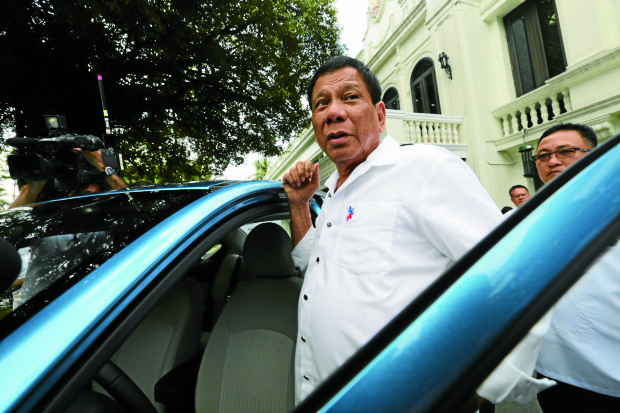Duterte admits knowing ex-cop in Davao Death Squad

President Rodrigo Roa Duterte answers questions during an ambush interview held in Malacanang grounds. INQUIRER PHOTO/JOAN BONDOC
President Duterte admitted on Monday that he knew retired SPO3 Arturo Lascañas, who had accused him of organizing the Davao Death Squad (DDS) when he was the Davao City mayor and allegedly gave orders not only to kill criminals but also his political opponents.
“Yes, I saw him once, twice a year,” Mr. Duterte told reporters.
The President was asked about Lascañas’ turnaround last week after the former officer had denied in a Senate inquiry last year that the DDS did not exist.
“Oh well, there might be another coming after recant of the recant, I’m sure,” he replied.
Asked if he was worried about Lascañas’ testimony at a Senate hearing on March 7, Mr. Duterte said he had already stated that hundreds of criminals died in Davao City during his 23-year-long tenure as mayor.
Article continues after this advertisement“They were really finished,” Mr. Duterte said.
Article continues after this advertisementHe said he ordered the Davao City police to go after criminals.
“They’re the same orders that I’m giving here. It so happens that other policemen there … because you know you have to give the police money, because if they go out and hunt for trafficking of drugs, there must be a selling and buying. Otherwise, there is no trafficking,” Mr. Duterte said.
That was why, he said, he would not deny Lascanas’ statement that he gave policemen money. He said the media could ask Davao policemen what he had given them at every command conference for operating expenses.
‘We became hired killers’
In a 12-page affidavit he submitted on Monday to the Senate committee on public order and dangerous drugs chaired by Sen. Panfilo Lacson, Lascañas repeated what he had said at a news conference last week, when he recanted his earlier Senate testimony that the DDS did not exist and claimed he actually was a DDS hit man who was paid by the then mayor.
“In the beginning, we targeted and killed drug addicts, drug pushers, snatchers, holduppers and other criminals. Later on, however, we were ordered by Mayor Duterte to go after and kill his personal and political enemies. We became like hired or contract killers who killed not only criminals but innocent people,” Lascañas said in his affidavit.
Among the political foes that the DDS killed was Davao radio broadcaster Jun Pala, for whom Lascañas said Mayor Duterte put out a P3-million contract.
Just as he stated in his public confession last week, Lascañas said in his affidavit that he was among the policemen and New People’s Army rebel returnees who gunned down Pala in 2003.
Also in his affidavit, he said over time it became the practice of the DDS to present to the mayor those they captured, especially criminals, “before we would kill them.”
“During the many years we operated the DDS, we brought many persons to Mayor Duterte, sometimes in his house and sometimes in other places,” Lascañas said.
Sen. Antonio Trillanes, who presented Lascañas to the media last week, said on Monday that aside from the affidavit, Lascanas had also made a video and kept a journal detailing the DDS operations.
Trillanes said Lascañas would submit this to the committee.
Waiting for affidavit
Director General Ronald dela Rosa told reporters on Monday that the Philippine National Police was waiting for a copy of Lascañas’ affidavit before it could conduct an investigation into his claims.
“We cannot react accordingly if there is nothing to react to. So, we must first get hold a copy of his affidavit, then we will see what will be our corresponding reaction,” Dela Rosa said.
The PNP chief said he was prepared to present to the Senate active officers who had been linked by Lascañas to the death squad if they would be called to testify.
Dela Rosa said he learned about Lascañas when he served as Davao City police director from Jan. 30, 2012 until Oct. 18, 2013.
“I really did not know him that well. I knew him as an individual member of the Davao City Police Office,” he said, adding that he did not know about Lascañas’ alleged “shady” reputation.
“When I was still the city director of Davao, I ran after these alleged death squads and told them, ‘If you are there, you come out in the open and let’s duel if you want to kill people,’” Dela Rosa said.
“I was challenging these people even then. I knew that there were deaths then that were very obvious ‘gun-for-hire’ operations. I was angry with those killings so I challenged them but no one came out,” he added.